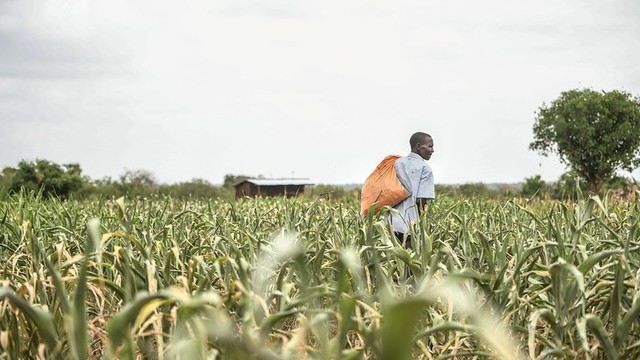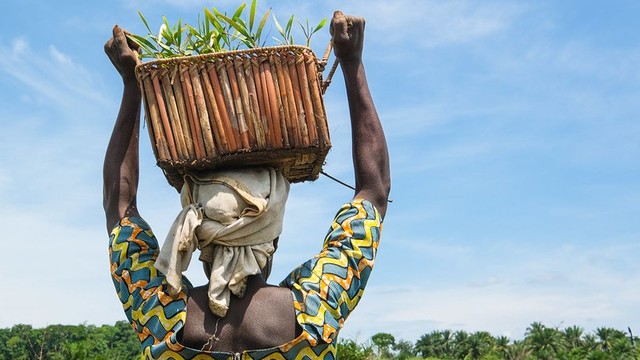Stockholm+50 must build a legacy of support for locally-led action for people, nature and climate
Global leaders will meet in Sweden at Stockholm+50 next week to reflect on five decades of action since the 1972 Stockholm conference that put the environment at the heart of international development. To coincide with the meeting, IIED has launched a report outlining why locally-led action for people, nature and climate is vital to progress.



A woman farmer harvests tea leaves on a plantation (Photo: Nkumi Mtimgwa/CIFOR, via Flickr, CC BY-NC-ND 2.0)
The 1972 United Nations Conference on the Human Environment was the first world conference to put the environment at the forefront of international development discussions. The resulting Stockholm Declaration set out 26 principles on environment and development and marked the start of a new era of global cooperation on environmental issues.
Fifty years on, the Stockholm+50 conference comes at a pivotal time. Amid major global challenges, it will sharpen political attention on the need to accelerate implementation of the UN Decade of Action to deliver the Sustainable Development Goals and the 2030 Agenda, the Paris Agreement on climate change and the post-2020 global biodiversity framework, and encourage the adoption of green post-COVID-19 recovery plans.
To coincide with Stockholm+50, IIED has issued a new report arguing that a mark of success for the high-level meeting will be a commitment from leaders to accelerate support and finance for locally-led action for people, nature, and climate – where decision-making power, financial flows and resources are transferred to the local level to get behind the priorities of Indigenous Peoples, local communities and other local actors.
Progress towards financing locally-led action since 1972 – what does the research show?
Many years of research by IIED, its partners and countless others has repeatedly highlighted the importance of getting finance to the local level. And yet very little funding reaches local actors, despite the fact they were recognised as critical to supporting sustainable development in the 1972 agreement.
This fails to support local actors to be active agents of change and to create space and recognition for their extensive local, intergenerational, indigenous, traditional and cultural knowledge needed to innovate and deliver sustainable development.
Last year we published research showing that only 46% of finance committed from international sources for climate adaptation was intended to give agency to local actors. Within this amount, there was little evidence of local actors fully leading adaptation interventions.
The same analysis also highlighted that several social groups facing higher levels of structural exclusion – women, youth, disabled people and Indigenous Peoples – are even more sidelined from playing leading roles in influencing adaptation funding.
For example, of the US$5.9 billion verified adaptation finance for least developed countries, only 20% intended to give women some level of engagement in decisions. Young people (12%), people living with a disability (2%) and Indigenous Peoples (1%) have an even lower level of intended engagement.
Finance providers – including governments, multilateral development, global funds and intermediaries – need to shift away from business-as-usual ways of working and rapidly move towards financing models that prioritise locally-led action for people, nature and climate.
Our report shows evidence of some emerging trends hinting at a positive shift over recent years, but more is needed. These trends now need to happen much more consistently and across all financing for climate and nature.
Stockholm+50 must prioritise locally-led action
As leaders seek to shape the next phase of their sustainable development, the Stockholm+50 meeting report must recognise the critical role of locally-led action in achieving sustainable development for people, nature and climate.
It must acknowledge that Indigenous Peoples and local communities need to be part of local, national and global decision-making processes, and need agency over finance and decision making at the local level.
Leaders at Stockholm+50 should join almost 80 governments and organisations, including Sweden, the United States, the United Kingdom, Ireland, the Netherlands, Denmark, Nepal and Costa Rica, in endorsing and committing to implement the principles for locally led adaptation (LLA), for example.
Our report sets out five recommendations and a series of supporting actions for governments, multilateral development banks, global funds and intermediaries to agree to in Stockholm. The recommendations focus on the need to:
- Increase the quantity, improve the quality, and strengthen the transparency of finance flows for locally-led action for people, nature, and climate
- Simplify access to finance
- Prioritise equitable governance of finance
- Strengthen investments in national and local institutions, including building national delivery mechanisms to get finance to the local level, and
- Tackle the underlying drivers of vulnerability and recognise the value of coherent responses to the triple crises of climate, nature and poverty in finance and all decisions.
What next for moving forward?
Stockholm+50 is an important milestone this year, but it's part of a longer series of meetings that need to collectively raise the ambition of getting finance and decision making to the local level.
For example, the upcoming UN biodiversity conference (CBD COP15) discussions should emphasise how locally-led action is essential to delivering the global biodiversity framework and transforming our relationship with nature. Similarly, COP27 should build on the high profile of locally-led action at COP26 by encouraging more endorsements for the LLA principles and showcasing implementation with local partners.
Stockholm+50 has the lofty ambition of achieving ‘a healthy planet for the prosperity of all – our responsibility, our opportunity’. Leaders must recognise that achieving this is not possible without prioritising locally-led action for people, nature and climate.
- Download 'Money where it matters for people, nature and climate: driving change through support for local level decision making over resources and finance'
- This blog and report have been produced with the generous support of the Swedish International Development Cooperation Agency (Sida). The report was launched on 25 May 2022 at an IIED Debates virtual event co-hosted by IIED and Sida.
- An official side event on this report and locally-led action for people, nature and climate was held at Stockholm+50 on Friday 3 June 2022, Room 2 (in person and livestreamed). Watch a recording of the event.



